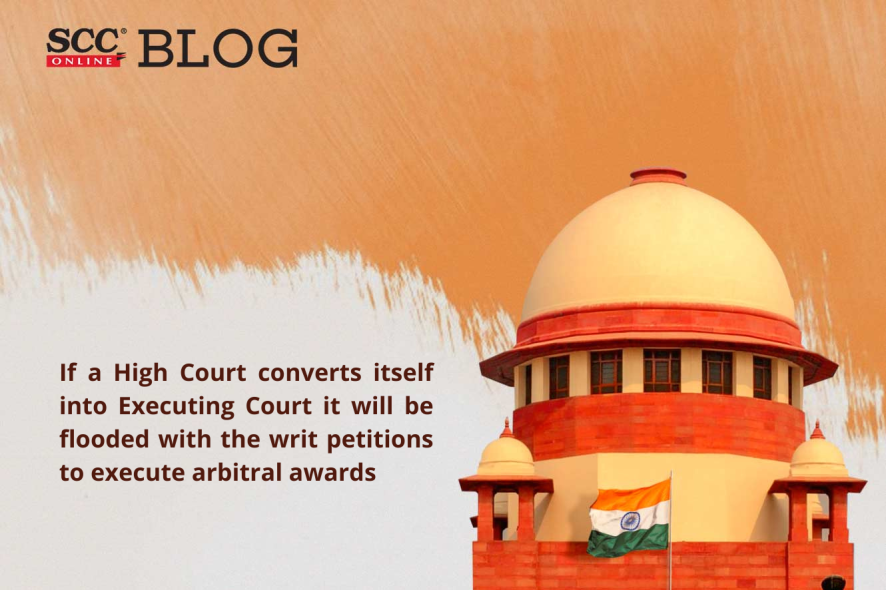Supreme Court: While adjudicating an appeal relating to arbitration, the Division Bench of M. R. Shah* and B.V. Nagarathna, JJ., held that by entertaining the petition under Article 226 for executing an arbitral award, the High Court had virtually converted itself into Executing Court.
Modifying the impugned judgment and order, the Court expressed,
“We disapprove the entertaining of such writ petitions under Article 226 of the Constitution to execute the award passed by the Arbitral Tribunal/Court, without relegating the judgment creditor in whose favour the award is passed to file an execution proceeding before the competent Executing Court.”
In a land acquisition matter, where the original land owners had approached the Bombay High Court with the writ petition under Article 299 for seeking a writ of mandamus against NHAI (National Highway Authority of India) for the execution of Arbitral award instead of filing an execution petition before the appropriate executing Court and the same was allowed by the High Court, the Court was posed with the question whether such a process can be resorted to when the appropriate alternate remedy is available?
The land in question was acquired by the NHAI under the provisions of the National Highway Authority of India Act, 1988 in connection of which the amount of compensation came to be enhanced by the Arbitrator.
The Court noted though the NHAI had challenged the said arbitration award under Section 34 of the Arbitration Act, 1996 to the extent of the enhanced amount, which is still pending, there was no stay on the award. Therefore, the Court opined that by passing the impugned order/directions the High Court had virtually converted itself into Executing Court. The Court remarked,
“The High Court ought not to have entertained the writ petition under Article 226 of the Constitution seeking the reliefs to execute the award passed by the Arbitral Tribunal/Court when the award is to be executed by initiating an execution proceeding before the Executing Court concerned.”
Considering that the original land owners had an efficacious, alternative remedy to execute the award by initiating an appropriate execution proceeding before the competent Executing Court, the Court opined that the High Court ought to have relegated the original writ petitioners to avail the said remedy instead of entertaining the writ petition under Article 226 of the Constitution.
Disapproving the procedure adopted by the High Court, the Court cautioned,
“If the High Courts convert itself to the Executing Court and entertain the writ petitions under Article 226 of the Constitution to execute the award passed by the Arbitral Tribunal/Court, the High Courts would be flooded with the writ petitions to execute awards passed by the Arbitral Tribunal.”
Hence, the Court opined that the impugned judgment and order should be set aside and quashed, however, considering the facts in particular, and relying on the similar order passed by this Court in the case of NHAI v. Saraswatibai Chandrakant Shinde (SLA No. 12409 of 2022), the Court disposed of the matter with the following directions:
- “The NHAI shall deposit 50 percent of the compensation amount awarded by the Arbitral Court, with the Executing Court within a period of four weeks.
- The said amount shall be released to the landowners unconditionally.
- The District Court, before whom the proceedings under Section34 of the Arbitration Act are pending shall make an endeavour to decide such proceedings within a period of six months from the next date of hearing before the said court.
- The balance amount of compensation as per the Award to be passed under Section 34 of the Arbitration Act, shall be deposited by the NHAI with the Executing Court within four weeks after such determination. The said amount shall also be released by the Executing Court in favour of the land owners subject to the rights and remedies available to the parties in law.”
With the above observations and directions, the Appeal was disposed of. The impugned order was modified in the above terms.
[NHAI v. Sheetal Jaidev Vade, 2022 SCC OnLine SC 1070, decided on 24-08-2022]
*Judgment by: Justice M R Shah
Appearance:
For the NHAI: ASG Aishwarya Bhati
For the Respondents: Advocate Shirish K. Deshpande
*Kamini Sharma, Editorial Assistant has put this report together.







